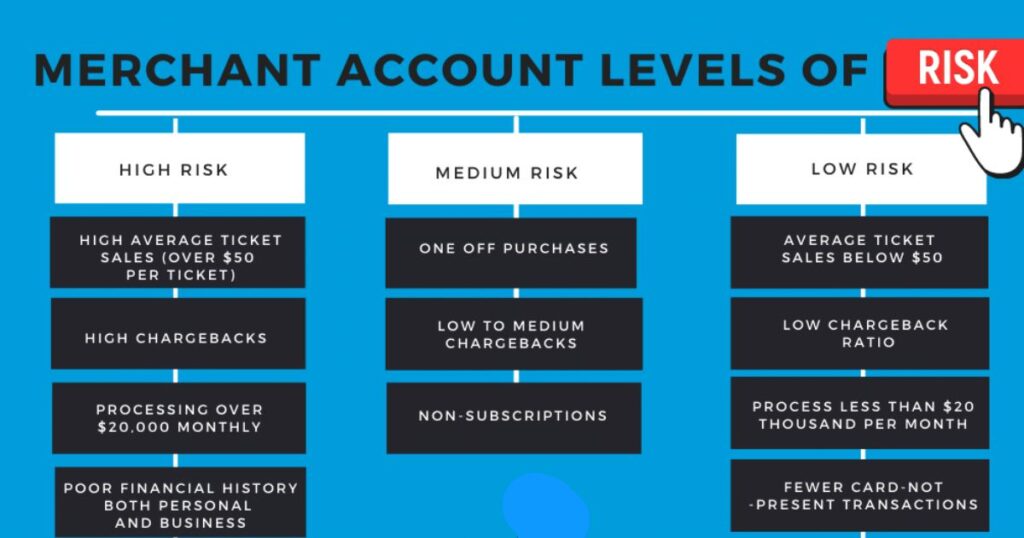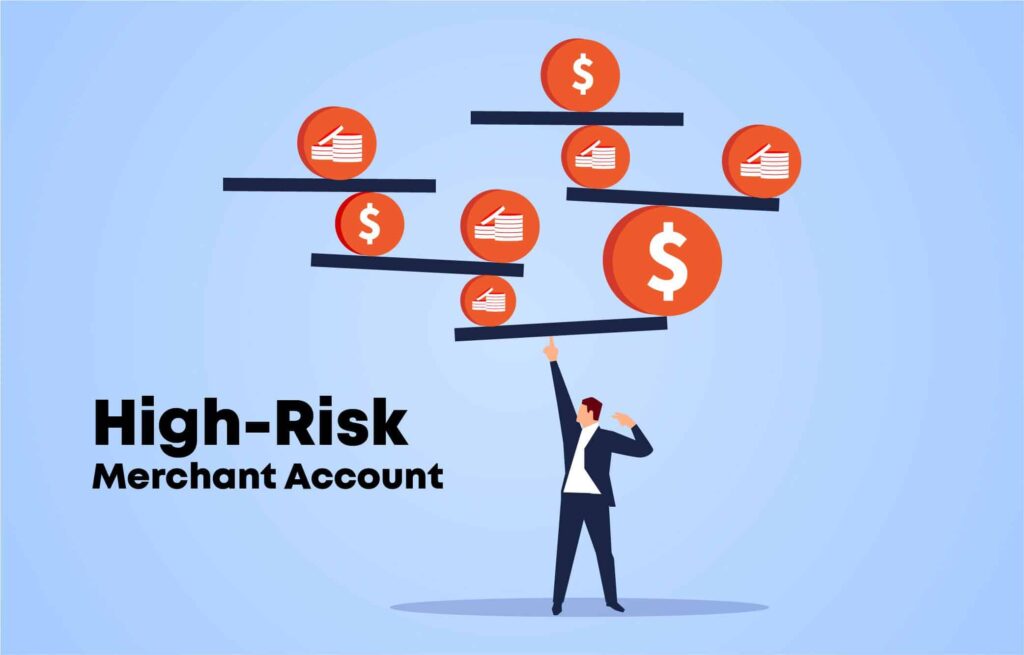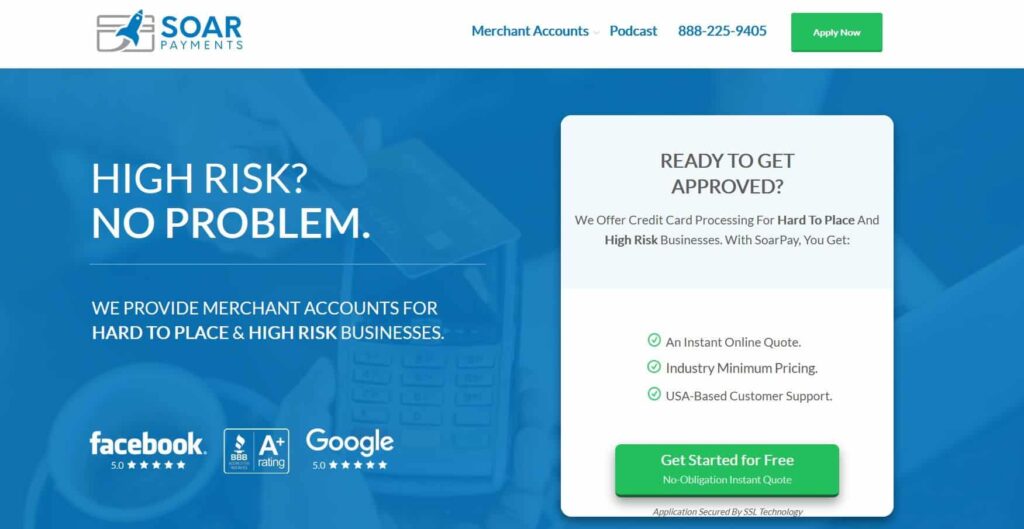Operating a business within a high-risk industry can be challenging, especially when it comes to finding reliable payment processing solutions. Traditional merchant accounts often reject businesses labeled as “high-risk,” making it difficult to process transactions and grow their operations.
This is where high-risk merchant accounts come into play, offering specialized services tailored to meet the needs of these unique businesses. In this comprehensive guide, we’ll explore what high-risk merchants are, the factors that contribute to their classification, and the benefits of using high-risk payment processing services, particularly those offered by Highriskpay.com.
What Is A High-Risk Merchant?
A high-risk merchant is a business that operates in an industry or sector that payment processors and banks consider to have an elevated risk of chargebacks, fraud, or legal liabilities. These industries are typically associated with higher rates of disputed transactions, regulatory scrutiny, or potentially controversial products or services. Some common examples of high-risk merchants include:
Online Gambling and Casinos
Online gambling and casino platforms are often classified as high-risk due to the potential for fraud, money laundering, and legal complexities surrounding the industry in various jurisdictions.
Adult Entertainment
Businesses involved in adult entertainment, such as pornography or escort services, are considered high-risk due to the sensitive nature of their products and the potential for chargebacks or legal issues.
Pharmaceuticals and Nutraceuticals
Companies that sell prescription drugs, supplements, or nutraceuticals online may be deemed high-risk due to the potential for counterfeit products, regulatory concerns, or the sale of controlled substances.
Firearms and Ammunition
The sale of firearms, ammunition, or related products is typically classified as a high-risk industry due to legal restrictions, potential misuse, and the sensitive nature of these products.
Travel and Tourism
Certain sectors of the travel and tourism industry, such as timeshares, travel clubs, or high-risk destination packages, may be considered high-risk due to the potential for fraud, disputes, or legal issues.
E-commerce and Dropshipping
Online retailers, particularly those engaged in dropshipping or selling high-risk products, may be classified as high-risk due to the potential for fraud, chargebacks, or issues with product quality or delivery.
Debt Collection
Debt collection agencies and related services are often considered high-risk due to the potential for consumer disputes, legal concerns, and the sensitive nature of their operations.
Cryptocurrency
Businesses involved in cryptocurrency trading, mining, or related services may be deemed high-risk due to the volatile nature of digital currencies, regulatory uncertainties, and the potential for fraud or money laundering.
Tech Support Services
Certain tech support services, particularly those offering remote access or software downloads, may be classified as high-risk due to the potential for fraud, malware distribution, or disputes over service quality.
Multi-level Marketing (MLM)
Multi-level marketing (MLM) companies and related businesses may be considered high-risk due to the potential for pyramid schemes, disputes over product quality, or legal concerns regarding their business practices.
What Makes A Merchant Considered A High-Risk Merchant?

Several factors contribute to a merchant being classified as high-risk, including:
- Industry type: As mentioned earlier, certain industries are inherently considered high-risk due to their nature, products, or services.
- Business model: Merchants with unconventional or complex business models, such as those involved in subscription-based services, recurring billing, or high-ticket items, may be deemed high-risk due to the potential for disputes or chargebacks.
- Credit history: Businesses with poor credit scores, a history of excessive chargebacks, or a lack of established credit may be considered high-risk by payment processors.
- Transaction volume and velocity: Merchants with sudden spikes in transaction volume or velocity may raise red flags for payment processors, leading to a high-risk classification.
- Geographic location: Businesses operating in certain countries or regions with higher rates of fraud or financial instability may be considered high-risk.
- Product or service quality: Merchants selling potentially counterfeit, defective, or controversial products or services may be classified as high-risk due to the increased likelihood of disputes or legal issues.
What Is A High Risk Merchant Account?

A high-risk merchant account is a specialized type of payment processing solution designed specifically for businesses operating in industries considered high-risk. These accounts are typically provided by payment processors or acquiring banks that specialize in serving high-risk merchants.
High-risk merchant accounts offer a range of features and services tailored to the unique needs of these businesses, including:
- Increased risk tolerance: Payment processors offering high-risk merchant accounts are willing to accept the elevated risks associated with these industries in exchange for higher processing fees or stricter underwriting criteria.
- Flexible terms and conditions: High-risk merchant accounts often have more flexible terms and conditions compared to traditional merchant accounts, allowing for greater flexibility in processing transactions and managing chargebacks or disputes.
- Enhanced security measures: To mitigate the increased risks, high-risk merchant accounts typically employ advanced fraud prevention measures, such as Address Verification Service (AVS), Card Verification Value (CVV) checks, and robust anti-fraud monitoring systems.
- Dedicated support: Many high-risk payment processors offer dedicated account management and support teams with expertise in handling the unique challenges faced by high-risk merchants.
How Does A High Risk Merchant Account Work?
The process of obtaining and using a high-risk merchant account typically involves the following steps:
- Application and underwriting: Merchants interested in obtaining a high-risk merchant account will need to go through a thorough application and underwriting process. This typically involves providing detailed information about their business, products or services, transaction history, credit history, and other relevant details.
- Risk assessment: The payment processor or acquiring bank will conduct a risk assessment based on the provided information and the merchant’s industry classification. This assessment will determine the level of risk associated with the merchant and the appropriate pricing and terms for their account.
- Account setup: Once approved, the high-risk merchant account will be set up, and the merchant will be provided with the necessary credentials and software to begin processing transactions.
- Transaction processing: Merchants can then begin accepting payments through their high-risk merchant account, with transactions being processed and settled by the payment processor or acquiring bank.
- Monitoring and risk management: Payment processors specializing in high-risk merchant accounts typically employ robust monitoring and risk management systems to detect and mitigate potential fraud, chargebacks, or other issues.
- Dedicated support: High-risk merchants can benefit from dedicated account management and support teams that understand the unique challenges and requirements of their businesses.
What Are The Benefits Of Using High-Risk Payment Processing?
While operating as a high-risk merchant comes with its challenges, utilizing specialized high-risk payment processing services can offer several significant benefits:
Enhanced Security Measures
High-risk payment processors employ advanced security measures and fraud prevention tools to protect both merchants and customers. This includes techniques such as Address Verification Service (AVS), Card Verification Value (CVV) checks, and robust anti-fraud monitoring systems. These measures help mitigate the risks associated with high-risk industries and reduce the likelihood of chargebacks, fraud, and other financial losses.
Flexibility to manage chargebacks
Chargebacks are a common concern for high-risk merchants, as their industries often experience higher rates of disputed transactions. High-risk payment processors offer increased flexibility in managing chargebacks, providing merchants with dedicated support and resources to address disputes and protect their revenue streams.
Safeguard Against Account Termination
Traditional merchant accounts may be quick to terminate or suspend accounts for high-risk businesses, even for minor infractions or spikes in transaction volume. High-risk payment processors understand the unique challenges faced by these merchants and offer greater stability and protection against account termination, allowing businesses to operate with confidence.
Empowering High-Risk Product Sales
By partnering with a high-risk payment processor, merchants can confidently sell their products or services without the limitations imposed by traditional payment processors. This enables them to expand their offerings, reach new markets, and capitalize on opportunities within their respective industries.
Tailored Solutions and Dedicated Support
High-risk payment processors offer tailored solutions and dedicated support teams that understand the unique challenges and requirements of high-risk merchants. This specialized approach ensures that merchants receive the guidance, resources, and customized solutions they need to succeed in their respective industries.
Which Are The Best High Risk Merchant Account Providers?

While there are several high-risk payment processors available in the market, some standout providers include:
PaymentCloud
PaymentCloud is a renowned high-risk payment processor that offers a comprehensive suite of services tailored to high-risk merchants. They specialize in industries such as online gambling, CBD/hemp, adult entertainment, and more.
Pricing
PaymentCloud’s pricing is customized based on the merchant’s industry, transaction volume, and risk profile. However, they are known for their competitive rates and transparent pricing structures.
Durango Merchant Services
Durango Merchant Services is a leading provider of high-risk merchant accounts, offering solutions for industries like nutraceuticals, travel, subscription services, and more. They prioritize fraud prevention and risk management while providing flexible terms and conditions.
Pricing
Durango Merchant Services offers customized pricing based on the merchant’s specific requirements. Their pricing typically includes a setup fee, monthly fee, and transaction fees based on the merchant’s risk level.
First Card Payments
First Card Payments specializes in high-risk merchant accounts for a wide range of industries, including firearms, adult entertainment, multi-level marketing (MLM), and more. They offer robust fraud prevention tools and dedicated account management.
Pricing
First Card Payments’ pricing structure includes a one-time setup fee, monthly account fees, and transaction fees that vary based on the merchant’s industry and risk profile.
Soar Payments
Soar Payments is a well-established high-risk payment processor that caters to industries such as online gambling, forex trading, e-cigarettes, and more. They offer advanced security features, chargeback management tools, and dedicated support.
Pricing
Soar Payments’ pricing model includes a setup fee, monthly account fees, and transaction fees that are tailored to the merchant’s specific needs and risk level.
SMB Global
SMB Global is a leading high-risk payment processor that serves businesses in industries like online gambling, adult entertainment, cryptocurrency, and more. They offer flexible terms, robust fraud prevention measures, and dedicated account management.
Pricing
SMB Global’s pricing structure includes a one-time setup fee, monthly fees, and transaction fees that are customized based on the merchant’s industry, volume, and risk profile.
eMerchantBroker
eMerchantBroker is a respected provider of high-risk merchant accounts, catering to industries such as nutraceuticals, travel, e-cigarettes, and more. They offer competitive rates, advanced fraud prevention tools, and dedicated customer support.
Pricing
eMerchantBroker’s pricing model includes a setup fee, monthly account fees, and transaction fees that vary based on the merchant’s industry, volume, and risk level.
HighRiskyPay.com
HighRiskyPay.com is a specialized high-risk payment processor that offers solutions for a wide range of high-risk industries, including online gambling, adult entertainment, CBD/hemp, and more. They prioritize security, fraud prevention, and dedicated account management.
Pricing
HighRiskyPay.com offers customized pricing based on the merchant’s specific requirements. Their pricing typically includes a setup fee, monthly account fees, and transaction fees tailored to the merchant’s industry and risk level.
Paykings
Paykings is a leading high-risk payment processor that serves businesses in industries such as online gambling, adult entertainment, CBD/hemp, and more. They offer robust fraud prevention tools, chargeback management solutions, and dedicated account support.
Features –
- Advanced fraud prevention tools
- Chargeback management solutions
- Dedicated account support
- Competitive pricing
- Global payment processing capabilities
It’s important to note that pricing and features may vary among these providers, and it’s crucial to thoroughly research and compare options to find the best fit for your high-risk business needs.
Which Are The High Risk Merchant Account Providers In Usa?
For businesses operating within the United States, some of the top high-risk merchant account providers include:
PaymentCloud
PaymentCloud is a well-known high-risk payment processor that serves U.S.-based merchants in industries like online gambling, CBD/hemp, adult entertainment, and more.
Pricing
PaymentCloud’s pricing is customized based on the merchant’s industry, transaction volume, and risk profile, but they are known for competitive rates and transparent pricing structures.
Durango Merchant Services
Durango Merchant Services is a leading provider of high-risk merchant accounts for U.S. businesses, offering solutions for industries such as nutraceuticals, travel, subscription services, and more.
Pricing
Durango Merchant Services offers customized pricing based on the merchant’s specific requirements, including a setup fee, monthly fee, and transaction fees based on the merchant’s risk level.
Easy Pay Direct
Easy Pay Direct is a reputable high-risk payment processor that caters to U.S.-based merchants in industries like online gambling, adult entertainment, nutraceuticals, and more.
Pricing
Easy Pay Direct’s pricing structure includes a one-time setup fee, monthly account fees, and transaction fees that are tailored to the merchant’s industry, volume, and risk profile.
These providers offer specialized solutions for high-risk merchants based in the United States, ensuring compliance with relevant regulations and providing dedicated support for businesses operating within the country.
What Is A Bad Credit Merchant Account?

A bad credit merchant account is a specialized type of payment processing solution designed for businesses with poor credit scores or limited credit histories. These accounts are typically provided by high-risk payment processors or acquiring banks that are willing to work with merchants who may not qualify for traditional merchant accounts due to their credit situation.
Bad credit merchant accounts offer a way for businesses with less-than-ideal credit to accept credit card payments and process transactions, enabling them to participate in the e-commerce marketplace and grow their operations.
However, it’s important to note that bad credit merchant accounts often come with higher processing fees, stricter terms and conditions, and additional security measures to mitigate the increased risk associated with merchants with poor credit histories.
What Is An Offshore High Risk Merchant Account?
An offshore high-risk merchant account is a type of payment processing solution that is based and operated outside of the merchant’s home country or region. These accounts are typically offered by payment processors or acquiring banks located in jurisdictions with more favorable regulations or lower compliance requirements for high-risk industries.
Offshore high-risk merchant accounts can be attractive for merchants operating in industries that face strict regulations or restrictions in their home countries. By utilizing an offshore account, these merchants can bypass certain limitations and access payment processing services that may not be available locally.
However, it’s important to exercise caution when considering offshore high-risk merchant accounts, as they may be subject to different legal and regulatory frameworks. It’s crucial to thoroughly research and ensure compliance with all relevant laws and regulations in both the offshore jurisdiction and the merchant’s home country.
Additionally, offshore high-risk merchant accounts may come with higher fees, potential currency exchange costs, and the added complexity of dealing with international banking and payment processing systems.
Conclusion
In summary, high-risk merchant accounts, including those offered by Highriskpay.com, provide specialized payment processing solutions tailored to meet the unique needs of businesses operating in industries considered high-risk. By partnering with reputable high-risk payment processors, merchants can benefit from enhanced security measures, flexibility in managing chargebacks, protection against account termination, and the ability to confidently sell their products or services. However, it’s crucial to carefully evaluate and select a provider that aligns with your business requirements, risk profile, and compliance needs.
